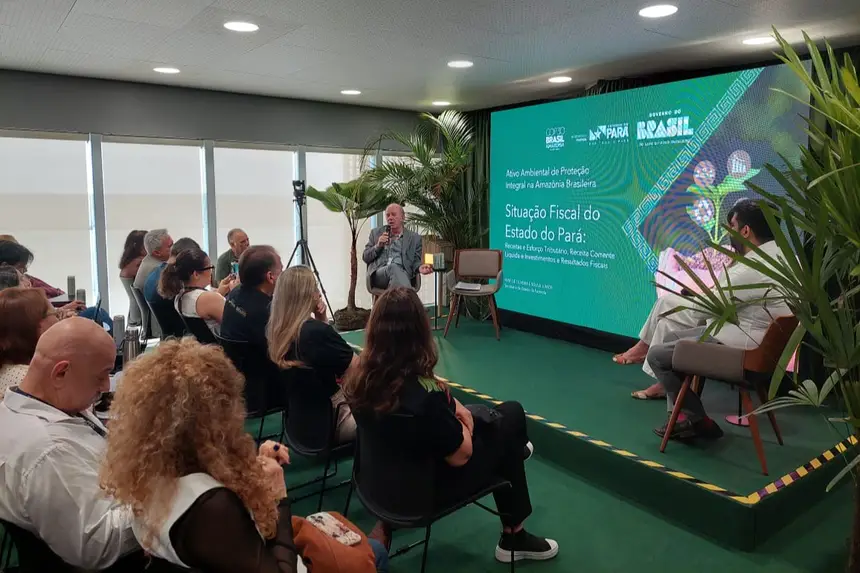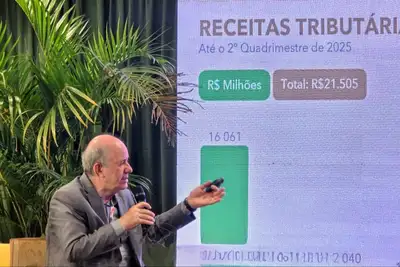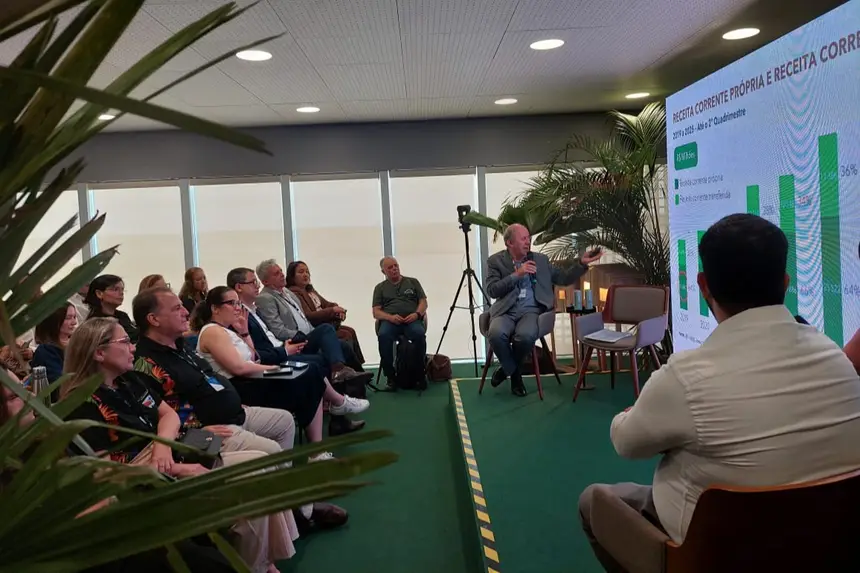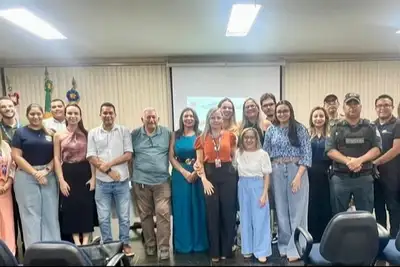Sefa addresses fiscal balance and nature protection strategies in Pará
Integral Environmental Asset in the Brazilian Amazon was the theme presented in a panel by the head of Sefa, René Sousa Júnior
Themes highlighting innovation and the state treasury's connection with sustainability were presented by the State Department of Finance (Sefa) this Monday (17), in the COP30 program, in the Green Zone, in Belém. Fiscal policy strategies aimed at protecting nature and the population of the region were discussed in the panels.
The State Secretary of Finance, René Sousa Júnior, participated in the panel on Integral Environmental Asset in the Brazilian Amazon, with senior associate of Global Brazil in Nature Finance, Gustavo Martins.

The initiative of the Interstate Consortium of the Legal Amazon (CAL), emphasized Gustavo Martins, aims to create economic mechanisms to recognize and reward the value of environmental assets of Integral Protection Conservation units, and strengthen sustainable finance in the region.
The goal is to generate financing models for the conservation of the Amazon, specifically for Integral Protection Conservation units, transforming environmental protection into a more economically advantageous activity. The idea is to strengthen the ecological transition in the region, demonstrating that preservation can be profitable, thus promoting sustainable development.
Fiscal targets - René Sousa Júnior highlighted that the holding of COP30 in Belém leaves a legacy of important works and proves that President Luiz Inácio Lula da Silva and Governor Helder Barbalho were right to bring COP to the Amazon. The secretary evaluated the fiscal targets, the result of revenues, and the tax effort of Pará, showing the balance of state public accounts.

The total gross revenue achieved, up to the second quadrimester of this year, reached R$ 41.832 billion, with R$ 21.505 billion in taxes. The growth of Own Revenue, between 2019 and 2025, was 118%, rising from R$ 11.697 billion in 2019 to R$ 25.530 billion in 2025, indicating that the State gained greater autonomy in relation to federal transfers, reported the head of Sefa.
Tax revenues, up to the second quadrimester of this year, totaled R$ 21.505 billion. The ICMS remains the largest state tax, representing 79.82% of total tax revenues.
Investments paid from January to August of this year totaled R$ 3.746 billion, representing 13.07% of the Net Current Revenue (RCL), which was R$ 28.651 billion in the same period.
The total primary revenue was R$ 29.114 billion, and the total primary expenditure reached R$ 27.934 billion, resulting in a primary surplus of R$ 1.180 billion. The consolidated debt was R$ 10.241 billion, and the net consolidated debt (DCL) was R$ 1.207 billion. According to current legislation, the State could have debts up to the limit of R$ 85.662 billion.
Cocoa in Pará – "Funcacau, financing the Sustainable Future of Cocoa Culture" was the theme addressed by state revenue auditor Augusto Miranda and agronomist Fernando Teixeira Mendes from Ceplac (Executive Commission of the Cocoa Crop Plan).
Last year, 53.7% of Brazilian production came from Pará. The state government, through the Cocoa Production Chain Development Program (Procacau) and the Cocoa Development Fund of Pará (Funcacau), provides technical support, research, training, and innovation for producers, ensuring quality and competitiveness. This develops the strategy to reduce deforestation, generate green jobs, and position Pará as a global reference in sustainable production.
Cocoa in Pará has evolved with sustainable practices and integration into the bioeconomy, moving from traditional cultivation to technified production, with a focus on agroforestry systems that reconcile productivity and conservation.
“The cocoa value chain is strategic for sustainability, as it helps recover degraded areas; forest preservation, income generation, and social inclusion,” concluded Augusto Miranda.

Public policies - Pará is developing a set of public policies aimed at sustainable development through the State Bioeconomy Plan of Pará (PlanBio), which brings together actions to promote bioeconomy with forest preservation; investment in research, development, and innovation; valuing cultural heritage and traditional knowledge; developing sustainable production chains; territorial planning and conservation, in addition to financing and economic incentives.
The State Amazon Now Plan (PEAA), Law No. 10.750/24, also integrates efforts, aiming to reconcile environmental preservation with economic development. Another essential investment in this context, said the secretary, is the Bioeconomy and Innovation Park of the Amazon, already delivered by the State.
The goals of Sefa, in Planbio and PEAA, are to develop and implement socio-environmental criteria to guide the granting of Differentiated Tax Regimes, within the scope of tax administration, and promote the formalization of ventures in the Amazonian sociobiodiversity, through technical guidance and simplification of processes.
Municipal Pavilion – Sefa will also participate in the programming at the Pará–Municipal Pavilion, with two lectures aimed at municipal public managers, technicians in finance, planning, and collection areas.
“Impacts of Tax Reform on States and Municipalities” will be the theme addressed on Tuesday (18), at 4 p.m., emphasizing the impacts of Constitutional Amendment No. 132/2023 and Complementary Law No. 214/2025, which deals with the Federative Pact. The focus will be on the transition to the new taxation model with the IBS (Tax on Goods and Services), the challenges of institutional and technological adaptation, and the role of municipalities in shared governance.
On Thursday (20), at 4 p.m., the theme “Impacts of Consumption Tax Reform on State and Municipal Finances” will be presented, analyzing the effects of replacing ICMS and ISS with IBS, the new criteria for revenue sharing, and the reflections on the financial autonomy of municipalities.
Racial equity – The coordinator of the Treasury School, Cristina Viana, and the consultant of the IDB (Inter-American Development Bank), Paulo Victor Squires, will also address, on Thursday (20), at 4 p.m., at the stand of the System of Courts of Accounts at COP30, in the Green Zone, the actions that Sefa is carrying out within the scope of the Racial Equity Pact, promoted by the State Court of Accounts (TCE), especially regarding the ethnic-racial survey of the Secretariat's servers.










